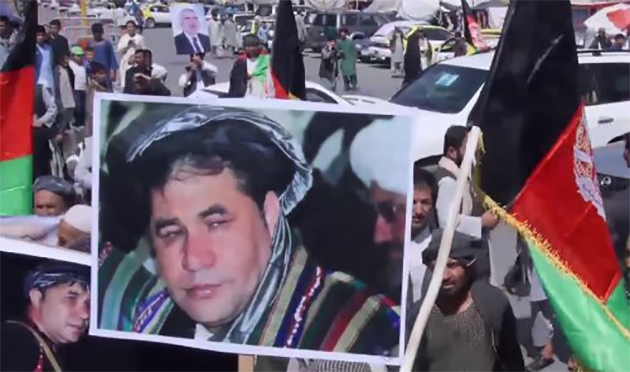Nezamuddin Qaisari, the Police Chief of Qaiser (Qaysar) district in Faryab province was arrested on 02 July 2018, Monday when he was amidst a meeting at the Camp of 209th Shaheen Army Corps, Maimana. He is considered a close aide to First Vice President General Abdul Rashid Dostum, who is in Turkey for the last one and half years. Both belong to same ethnicity and also political affiliation, Junbish-i-MilliIslami Afghanistan (National Islamic Movement of Afghanistan). He is also a commander of Khezesh-e Mardomi (Public Uprising), a local militia group in Faryab province fighting the Taliban.
Police officials are neither expected to be associated with any political party nor with any militia activities, as these are against the Code of Conduct but in Afghanistan, these violations seem to be the prevailing norm.
Geographically speaking Qaysar is almost 50 km south-west of Maimana, the province headquarters of Faryab province and Jowzjan is in north-east. Qaisariis an influential leader and most of the time he could be found in Maimana. He has been supported by the government and was given state patronage.
Reportedly, Qaisari was called to attend a meeting on 02 July 2018, which was attended by senior officials of the Afghan security institutions including Deputy Minister of Defence, National Directorate of Security (NDS) Chief and theProvince Police Chief. There, he insulted the officials in relation to the security of the Maimana - Jowzjan highway and warned that he will ‘kill them, close security departments in the province and burn them down’ if the road security remained insecure.
Immediately after his arrest by Afghan National Army Special Forces, he was flown to Kabul aboard a helicopter and has been held in detention.
Facts are simple and can be paraphrased as follows: insulting and criminal intimidation to government and military officers. Qaisari’s acts constitute offences under the Afghan Penal Law and Afghan Military Law. His criminal threats could be extended to waging a war against the state, as he threatened to burn down state institutions. These, at par se, are serious criminal offences if ingredients of crime exist which are: mensrea and actusreus. In the absence of intention, planning and material ability, his acts may qualify to ‘do not behave’ to his status and position and unbecoming of a public servant. He could be placed under suspension and even dismissed from his position of Chief of Police.
Rule of law based criminal justice system expects that his acts should be credibly investigated. He should face justice on the basis of material facts, which would have led to his arrest and prosecution. Immediate detention is also possible, if he poses serious and grave threats and/ or there are reasonable apprehension of his fleeing and escaping from justice. This was exactly followed but some quarters expressed reservations on respect to the rights of suspect and due process.
Due process ensures ‘justice must not only be done, but must be seen to be done’ and some of the facts may suggest contrary leading to violation of his rights.
After 12 days in detention on around 14 July 2018, the attorney general office (AGO) charged him on 20 serious charges including use of force, intimidation, armed clashes with political rivals, hatching conspiracies, committing illegal economic activities, issuing false statements, and committing financial crimes. A responsible police officer entrusted to uphold the law engaged in criminal activities. Also, as reported, recently in Feb 2018, Municipality Administration after getting approval of the provincial governor asked the police and attorney’s office to interrogate him on charges of corruption. This move infuriated him and his personnel went to Mazar-i-Sharif and Herat gates where they forcefully removed the municipality personnel and got control over the revenue from toll taxes.
According to reports, all his bodyguards numbering around 20 were arrested on the same day and later eight have been released. It is reported that he runs a force of around 800 armed men who carry light and heavy weapons including Kalashnikovs, mortars, rocket launchers, heavy machine guns, and light artillery guns, in addition to illegally holding 20 police Ranger pickup vehicles, six armored Humvees and a large number of illegally obtained ANDSF personal equipment.
The factual narrative of charges demonstratesthe realties of Afghanistan where many de-facto states exist within one state.
People like Qaisari are armed regional leaders who often dominate in their own regions where they can sustain the support systems including financial support, social acceptability, rationalization and local support. These are the products of the weak Afghan state and continued insurgency. These arose out of need of the constituency whom they claimed to represent. They reflect the socio political dynamics of the region and the society.
The state building requires accommodating these realities and then addressing the root cause for these, which are: establishing supremacy of the state across the country, exclusive jurisdiction of the state to use force, inclusive political, government and economic institutions, good governance, transparency and accountability in state affairs including security set up and criminal justice system. States under conflict lack structured institutions adhering to due process respecting the individual rights.
Whatever was the triggering mechanism for the arrest of Qaisari but subsequent fall out: demands in Kabul and few north and north eastern provinces seeking his release, attacks on police and security institutions, closing of the government institutions, and expression of extremely charged emotional sentiments such as ‘derail election’, ‘boycott election’, and ‘form their own autonomous government’ are worrisome.
Home » Opinion » Lesson learned from the Nezamuddin Qaisari saga: Paradigm shift needed to transform ‘Revenge to Justice’ (P1)
Lesson learned from the Nezamuddin Qaisari saga: Paradigm shift needed to transform ‘Revenge to Justice’ (P1)
| Upendra Baghel

